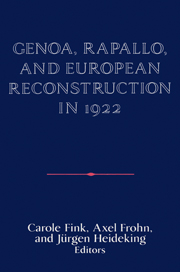Book contents
- Frontmatter
- Introduction
- 1 Beyond Revisionism: The Genoa Conference of 1922
- 2 The Genoa Conference of 1922: Lloyd George and the Politics of Recognition
- 3 A Rainy Day, April 16, 1922: The Rapallo Treaty and the Cloudy Perspective for German Foreign Policy
- 4 Reparations in 1922
- 5 Germany and the United States: The Concept of World Economic Interdependence
- 6 American Policy Toward Debts and Reconstruction at Genoa, 1922
- 7 French Plans for the Reconstruction of Russia: A History and Evaluation
- 8 The Oil Problem and Soviet-American Relations at the Genoa Conference of 1922
- 9 Italy at the Genoa Conference: Italian-Soviet Commercial Relations
- 10 The European Policy of Czechoslovakia on the Eve of the Genoa Conference of 1922
- 11 The Genoa Conference and the Little Entente
- 12 The Role of Switzerland and the Neutral States at the Genoa Conference
- 13 The Genoa Conference and Japan: A Lesson in Great-Power Diplomacy
- Maps
- Appendix
- Bibliography
- Contributors
- Index
10 - The European Policy of Czechoslovakia on the Eve of the Genoa Conference of 1922
Published online by Cambridge University Press: 05 January 2013
- Frontmatter
- Introduction
- 1 Beyond Revisionism: The Genoa Conference of 1922
- 2 The Genoa Conference of 1922: Lloyd George and the Politics of Recognition
- 3 A Rainy Day, April 16, 1922: The Rapallo Treaty and the Cloudy Perspective for German Foreign Policy
- 4 Reparations in 1922
- 5 Germany and the United States: The Concept of World Economic Interdependence
- 6 American Policy Toward Debts and Reconstruction at Genoa, 1922
- 7 French Plans for the Reconstruction of Russia: A History and Evaluation
- 8 The Oil Problem and Soviet-American Relations at the Genoa Conference of 1922
- 9 Italy at the Genoa Conference: Italian-Soviet Commercial Relations
- 10 The European Policy of Czechoslovakia on the Eve of the Genoa Conference of 1922
- 11 The Genoa Conference and the Little Entente
- 12 The Role of Switzerland and the Neutral States at the Genoa Conference
- 13 The Genoa Conference and Japan: A Lesson in Great-Power Diplomacy
- Maps
- Appendix
- Bibliography
- Contributors
- Index
Summary
“The historian of European politics will have to dwell seriously on the Genoa Conference,” said Edouard Benes in a speech to the Czechoslovak National Assembly four days after the end of the conference. Thereby the head of government and foreign minister of the First Republic referred not simply to the immediate results of the Genoa Conference but also to the fact that this meeting of the major political leaders of thirty-four governments, including Soviet Russia and Germany, which had lasted six weeks, had been the “first international expression of the political and economic community of Europe” after World War I. This evaluation has survived for almost seven decades, as witnessed by Carole Fink's work published in 1984. There is little to add to this monograph, which draws on the materials of all the important archives of Western Europe and the United States. Nevertheless, this contribution will describe the events preceding the Genoa Conference from the viewpoint of Czechoslovakia on the basis of sources little used up to now.
At the end of 1921, Europe was in crisis. The conflicts of interest between the European Great Powers, France and Great Britain, which had burst open during the peace negotiations at Paris, began to endanger the guarantee mechanisms of the Versailles system even before they were firmly established. The clarification of such important questions as the affiliation and inclusion of Soviet Russia and Germany in the postwar economic order was still pending when the leaders of the major European powers traveled for the first time to the United States in November 1921. At the Naval Disarmament Conference in Washington decisions were made about the postwar regulation of the Pacific and the Far East.
- Type
- Chapter
- Information
- Genoa, Rapallo, and European Reconstruction in 1922 , pp. 171 - 186Publisher: Cambridge University PressPrint publication year: 1991

